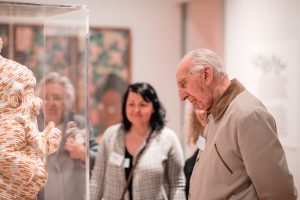by Debbie Kinsey

Dementia can be very socially isolating both for the person with dementia and those who care for them. Isolation and loneliness are incredibly common in older people and are both much harder to cope with when those people are also living with dementia. Many people find it more difficult to access community venues and events, and to either continue with previous interests or find new ones, especially when the general assumptions about what people with dementia are able to do can be so negative.
There‘s increasing work on finding ways to support carers of people with dementia in ensuring they live as well as they can with the condition. This includes considering what the cultural arts could offer, particularly as they gain evidence more generally in holistic healthcare. Exeter’s Royal Albert Memorial Museum (RAMM) has been dementia-friendly since 2013.
RAMM offers monthly dementia-friendly activities including object-handling, art-making, and exhibition tours, as well as quarterly special events including music in the museum. Volunteering on RAMM’s programme has given me valuable insights into how these programmes (and museums in general) function, and hugely influenced my thinking and the work I’m doing now.
Museums are places that are accessible (and often free!) beyond just the time a group or activity is actually happening. This means dementia-friendly activities in places like museums may be particularly valuable in opening up spaces in the community for people with dementia, as well as simply being interesting and stimulating.
Over the past year, I’ve been working closely with RAMM in Exeter. As part of my PhD research examining museum programmes for people with dementia, I’m creating a theory examining the impact of including carers in dementia programmes on the person with dementia, the carer, and the relationship between them. Although this will be within a museum-specific context, the theory should be applicable more generally across many aspects of dementia care and wider.
Despite the fact that most interventions and programmes (including those in a museum context) do involve carers, there’s very little research examining the impact of this. If we can understand this impact, we can enable museums programmes to run more effectively through understanding who they work for (and, just as importantly, who they don’t work for), and what works for whom. It will also indicate how to best support people on the programme, as well as providing general evidence for their effectiveness.
The kind of museum programme I’m interested in is focused on the present moment, rather than on reminiscence. It’s about enjoying the activity, being intellectually stimulated, expressing yourself, and socialising in a group. It’s also about the shared experience of the person with dementia and their caregiver – enjoying the activity on an equal basis.
For example, recently, a daughter and mother came to an object-handling session at RAMM. The mother has dementia and is legally blind, and her daughter was struggling to find activities which were both accessible and related to her mother’s interests. After tea and coffee, they held objects together and talked about the different textures and shapes they could feel. The daughter described some of what the objects looked like, but they focused on the shared tactile experience of the objects. It was a lovely example of the ‘in the moment’ shared and accessible activities the museum aims to offer.
These programmes are facilitated in a way that isn’t reliant on memory, but rather on the thoughts and ideas of the attendees in the moment. This enables people with and without dementia to participate on an equal basis. The activities are designed and adapted for people with dementia, but they’re not about dementia – the emphasis is always on enjoying the museum and the activity together.
One man with dementia who participated had difficulties with aphasia (a language impairment). But in a tour session he was able to contribute a really interesting insight into some artwork, specifically because the facilitation style allows people the space and time they need. It’s also set up to be ‘failure-free’ – there are no wrong answers when the question is what do you think about this? Information about the artwork or objects are woven in (and people always ask for information about what they’re seeing or holding), but it’s not a lecture, it’s more a part of the discussion.
It’s this supportive and uplifting facilitation style which is key in opening up the museum and allowing equal participation. One carer who came with his wife said it’s something that’s for him as well as for her, in part because it’s not “dumbed down.” It’s still the same museum, just facilitated differently.
Dementia care is like care for any chronic health condition – it’s more than just about management but finding a way to live as well and as fully as possible, and these kinds of programmes hopefully contribute to that. One participant said: “People ask me why enjoy myself, if I’m only going to forget it. I say why not enjoy myself, even if I forget it… I’ve loved every minute.”
More details and booking can be found here!
This work forms part of a PhD funded by the Dr & Mrs Alfred Darlington Charitable Trust.